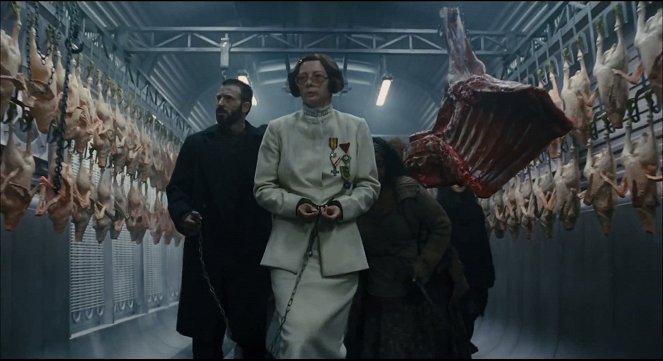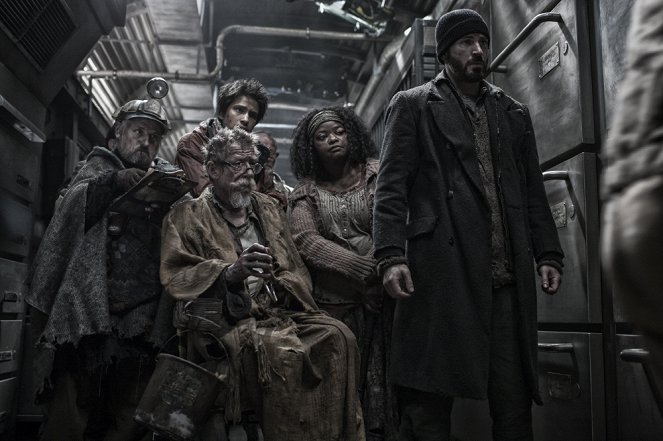Directed by:
Joon-ho BongCinematography:
Kyung-pyo HongComposer:
Marco BeltramiCast:
Chris Evans, Kang-ho Song, Jamie Bell, Tilda Swinton, Octavia Spencer, John Hurt, Ewen Bremner, Alison Pill, Ed Harris, Ah-seong Ko, Kenny Doughty (more)VOD (3)
Plots(1)
After a failed global-warming experiment, a postapocalyptic Ice Age has killed off nearly all life on the planet. All that remains of humanity are the lucky few survivors that boarded the Snowpiercer, a train that travels around the globe, powered by a sacred perpetual-motion engine. A class system has evolved aboard the train, fiercely dividing its population-but a revolution is brewing. The lower-class passengers in the tail section stage an uprising, moving car-by-car up toward the front of the train, where the train's creator and absolute authority resides in splendor. But unexpected circumstances lie in wait for humanity's tenacious survivors. (Entertainment One)
(more)Videos (5)
Reviews (16)
With Snowpiercer, Bong Joon-ho confirms his status as a maker of completely unique films who is able to brilliantly combine magnificent and intense spectacle with a unique vision and a supremely creative approach. Although Snowpiercer is based on the motifs of a French comic book, Bong took inspiration only from the source work’s basic premise, into which he inserted his own story (as in the case of his previous films, this time Bong is both the director and screenwriter; American screenwriter Kelly Masterson was responsible only for adapting the dialogue into English). Bong again builds the narrative on opposing principles, the combination of which gives rise to a unique, multifaceted work. In specific terms, we have a depressing Kafkaesque parable about our world and the individual caught in the gears of a rigid system presented using the blueprint of a seemingly Hollywood-style (but also Eisenstein-esque) tale of rebellion, conceived as a “blockbuster project with a devilishly unpredictable plot”. Together with the protagonists, the brilliant narrative gradually reveals to us the various levels of the hierarchy and the components that ensure the functioning of the microcosm, while concurrently and seemingly inadvertently giving us clues that much later will fit into the overall picture of a world founded on fear and anxiety. This world is in the form of a train, which, like a perpetual-motion machine, runs on tracks that do not have the form of a line with a beginning and an end, but an endless loop with regularly repeating cycles. Change is an illusion within this system, from which there is only one way out, but it is as intoxicating as a drug and as terrifying and final as the apocalypse. The common creative principle in Bong’s previous films, which we can describe as the subjugation of the direction of the original genre story through ambiguous and complex characters, is brought to its maximum level and meta-reflection in Snowpiercer – the ideal of the folk hero and rebellion against the establishment is gradually twisted as an increasingly complex view of the film’s world, of which the characters are integral and essential parts, is revealed to the viewers. _____ In the context of the narrative ideas contained in Snowpiercer, the story of the film’s distribution is paradoxical. What was supposed to be a magnificent story about how a distinctive filmmaker from South Korea created an international hit ultimately turned out to be a cruel slap in the face by the calculating Weinstein pigs who ruthlessly prevented any early international releases of the film (with the exception of France, where the rights had been sold earlier and where the film appeared at a few minor festivals and eventually on Blu-ray, which became the source of the copies that flooded the internet, thus significantly limiting the chance of earning box-office revenues in other countries, where the film is finally appearing after many months of haggling). Following this thorough reminder of where their place is in the global market, it cannot be expected that the disappointed director and the majority production company, CJ Entertainment, will attempt another project that goes beyond the Asian market and limited release abroad any time soon (more information on this affair is available here).
()
(less)
(more)
At first I felt like I was back in Train to Busan (if you like movies on a train, I recommend watching it), and got a little lost in the darkness, but once the director's favorite Kang-ho Song joined in, I started to enjoy the erratic ride. In the second part of the film, the director's favorite theme, the clash between two completely different social classes, comes into play. Bong Joon-ho revels in this and knows how to give it the right contrast. Anyone who has ever walked on a plane from Economy Class to First Class actually has a bit of a trailer for this film. It's just a little more extreme here. 3.5 stars.
()
Some time ago this train just blew past me, but when the Oscar buzz was revolving around its director a few years later, I tried to find out what was going on at Barrandov at that time. And it's a surprising gem that's sometimes a thriller, sometimes an existential drama, and sometimes even a calm action RPG. I love that feeling when I have no idea what might happen the next minute, and when no explanation is too far-fetched to be true. And believe me, once a viewer explores the fan theory that Snowpiercer takes place in the same world as Willy Wonka, there is no turning back.
()
Czech-Korean-British-French-American collaboration on an unusual sci-fi about a “train that doesn’t stop, never stops, never stops anywhere" where people behave like animals. And it’s obvious who made it. The same as in his other works, this refuses to follow the rules, sometimes making it seem a little gratuitous and exhibitionistic, but most of the time it benefits to movie.
()
Snowpiercer is one of the purest transferences of video-game narrative structure into film. The protagonists constantly advance, progressing from bare-knuckle fighting to cutting weapons and fire to guns and explosives. Each rail car (mission) has a distinctly different design, and we can also understand the POV shots with night-vision goggles as a reference to the game’s aesthetic. After every action there is a reward in the form of plot-shaping information about one of the characters and their motivations (which vary – children, drugs, revenge – thanks to which we can clearly separate the individuals from the united group). ___ However, the narrative’s clarity and fluidity are due not only to the fact that it is broken up into many smaller parts. Though it is absolutely clear from the beginning where the plot is going (yes, forward), we are constantly kept in a state of anticipation and surprised by the various hints, diversions and ellipses (for example, we may incorrectly believe that the rabble at the end of the train are missing limbs because those limbs have “frozen to death”). ___ Besides creative contrasts (the colourful “shock” in the form of a school classroom), the straightforward paving of the way forward is livened up by unexpected incursions of other genres (a brutal massacre interrupted by the welcoming of the new year, a musical interlude with children) and by the characters’ unconventional behaviour (not all positive heroes always behave “humanly”). Bong doesn’t tell us anything that we don’t (or won’t) need to know in order to understand the protagonist and the main storyline connected to him and every seemingly superfluous item of information, conveyed verbally or visually, is utilised sooner or later (the matches, the snowflake, the polar bear, other characters’ conversations with Curtis). ___ The speed with which the individual rail cars alternate corresponds to the amount of information that has to be shared. At the midpoint of the film, Curtis correctly says “I can go faster”, and the pace actually accelerates (there are more frequent cuts to the landscape outside of the train, for example) and important characters begin to die at an increasing rate. ___ Though the direction of the narrative indicates that it will turn out to be a naive drama of social revolution along the lines of Elysium, the ideological position that the form ultimately assigns to Curtis is ambiguous. (Nor does the outlined regime bear the unambiguous hallmarks of fascism. Apart from the eugenic measuring of children and the capitalistic transformation of a person into a replaceable part of the production mechanism, we are also witnesses to the building of a cult of personality and the introduction of newspeak of the “shoe = disorder” type that characterises any given totalitarian regime.) Instead of clear answers similar to those provided at the end of The Matrix, the climax raises a number of new questions and from the space of some sort of archaically straightforward narrative (it’s impossible not to recall old slapstick farces, westerns and phantom rides), we, like Curtis, are thrown from blissful ignorance into our post-ideologically and post-modernistically unintelligible reality. ___ Perhaps I’m overstating the case, but Snowpiercer is not just another dumb action flick in which the idea is subordinate to the spectacle. At least in my case, intellectual and sensory pleasure were in balance. 85%
()
(less)
(more)


